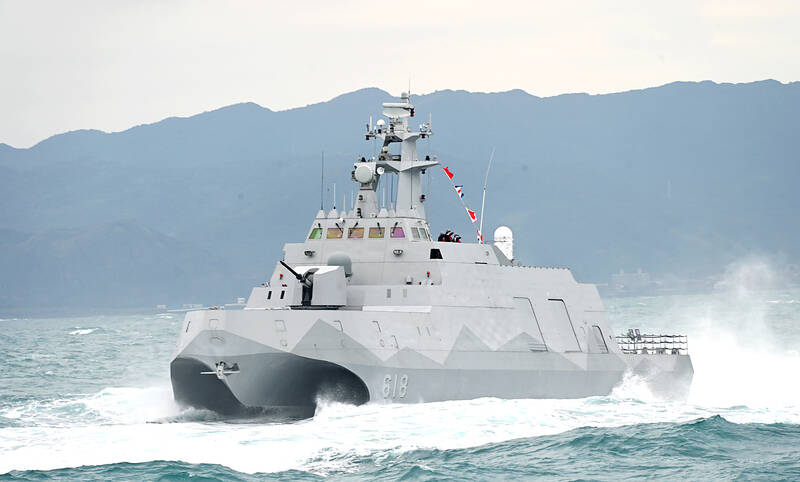Three members of the Control Yuan have demanded that the Ministry of National Defense address the navy’s negligence in drills and devote more resources to its military academies to bolster Taiwan’s combat capabilities.
Wang Mei-yu (王美玉), Lai Ting-ming (賴鼎銘) and Fan Sun-lu (范巽綠) issued their criticisms as part of an investigative report that was reviewed and approved internally on Sept. 21, a Control Yuan statement said yesterday.
Among the areas found to be deficient, they were critical of the navy’s lack of shooting drills and the poor test results of one of its newest vessels.

Photo: Tien Yu-hua, Taipei Times
For example, the Naval Fleet Command has not held any surface shooting drills or maintained or trained people on the Phalanx Close-In Weapon System installed on its vessels for three years, the statement said.
Also, the members found the navy’s newest Tuo Chiang-class corvette, the ROCS Ta Chiang, tested poorly during drills, and there was no re-examination of its combat capabilities as required in related regulations, the statement said.
Based on that “negligence,” they advised the ministry to hold regular live-fire exercises utilizing those systems to strengthen its vessels’ readiness for an emergency or even war.
The Control Yuan report was also critical of military schools and academies, according to the statement.
The schools, which are aimed at helping commissioned and non-commissioned officers develop applied science and technical skills, had not provided enough resources and support to teachers, students and researchers, the statement said.
Those shortcomings have meant that 40 percent of teachers have not received mandated promotions in the last eight years, and academic thresholds for selecting students have slid annually, especially in the area of English, it said.
It highlighted a rising drop-out rate among students in military schools, a problem that the military’s counseling system, along with other offices, should investigate, check and amend.
It also found problems with the Reserve Officers’ Training Corps (ROTC), set up in 1998 to attract more college students to the armed forces during their vacations and after graduation, through lower tuition and other financial incentives.
The report has also found that the service periods of students enrolled in the ROTC were shorter than the service periods of students in military academies, yet students graduating from both systems were able to obtain the same ranks and positions.
That has raised a potential problem of students preferring to join the military through the shorter ROTC program, which could further hurt military academy admissions in the long run, the report said.

The first two F-16V Bock 70 jets purchased from the US are expected to arrive in Taiwan around Double Ten National Day, which is on Oct. 10, a military source said yesterday. Of the 66 F-16V Block 70 jets purchased from the US, the first completed production in March, the source said, adding that since then three jets have been produced per month. Although there were reports of engine defects, the issue has been resolved, they said. After the jets arrive in Taiwan, they must first pass testing by the air force before they would officially become Taiwan’s property, they said. The air force

GLOBAL: Although Matsu has limited capacity for large numbers of domestic tourists, it would be a great high-end destination for international travelers, an official said Lienchiang County’s (Matsu) unique landscape and Cold War history give it great potential to be marketed as a destination for international travelers, Tourism Administration Director General Chen Yu-hsiu (陳玉秀) said at the weekend. Tourism officials traveled to the outlying island for the Matsu Biennial, an art festival that started on Friday to celebrate Matsu’s culture, history and landscape. Travelers to Matsu, which lies about 190km northwest of Taipei, must fly or take the state-run New Taima passenger ship. However, flights are often canceled during fog season from April to June. Chen spoke about her vision to promote Matsu as a tourist attraction in

PAWSITIVE IMPACT: A shop owner said that while he adopted cats to take care of rodents, they have also attracted younger visitors who also buy his dried goods In Taipei’s Dadaocheng (大稻埕), cats lounging in shops along Dihua Street do more than nap amid the scent of dried seafood. Many have become beloved fixtures who double as photography models, attracting visitors and helping boost sales in one of the capital’s most historic quarters. A recent photo contest featuring more than a dozen shop cats drew more than 2,200 submissions, turning everyday cat-spotting into a friendly competition that attracted amateur and professional photographers. “It’s rare to see cats standing, so when it suddenly did, it felt like a lucky cat,” said Sabrina Hsu (徐淳蔚), who won the NT$10,000 top prize in

STRIKE: Some travel agencies in Taiwan said that they were aware of the situation in South Korea, and that group tours to the country were proceeding as planned A planned strike by airport personnel in South Korea has not affected group tours to the country from Taiwan, travel agencies said yesterday. They added that they were closely monitoring the situation. Personnel at 15 airports, including Seoul’s Incheon and Gimpo airports, are to go on strike. They announced at a news conference on Tuesday that the strike would begin on Friday next week and continue until the Mid-Autumn Festival next month. Some travel agencies in Taiwan, including Cola Tour, Lion Travel, SET Tour and ezTravel, said that they were aware of the situation in South Korea, and that group